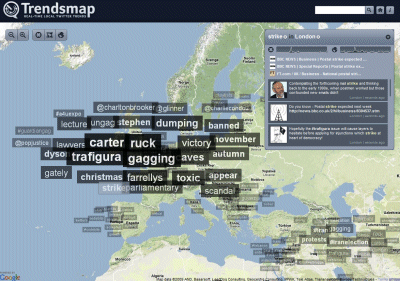This morning the Guarding reported that it had been forbidden from reporting on a question to be asked in the UK parliament:
The Guardian is prevented from identifying the MP who has asked the question, what the question is, which minister might answer it, or where the question is to be found.
The Guardian is also forbidden from telling its readers why the paper is prevented – for the first time in memory – from reporting parliament. Legal obstacles, which cannot be identified, involve proceedings, which cannot be mentioned, on behalf of a client who must remain secret.
The only fact the Guardian can report is that the case involves the London solicitors Carter-Ruck, who specialise in suing the media for clients, who include individuals or global corporations.
The clue was enough for others to identify the case, which involves oil traders Trafigura, and Twitter responded in style, as the following image from Trendsmap demonstrates:

A few hours later the injunction was lifted. Although there is no way to show what influence the Twitter activity had on the matter, it at least demonstrates how the real time web can publicise events that others are trying to keep hush.
One question remains. What happened to “publish and be damned”? Maybe this is now unaffordable, which remains a worry from a freedom of speech perspective.
Good to hear now that the Guardian is able to report on the story now.38 Degrees are currently running a campaign on this. Take action now by emailing your MP and asking them to take a stand to stop this happening again in the future. Take action now, it only takes 2 mins. Go to:
http://www.38degrees.org.uk/stop-the-gag
‘One question remains. What happened to “publish and be damned”?’
I think it’s more a case of “publish and be imprisoned”.